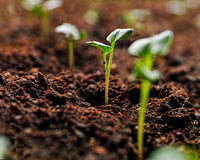It’s been an unexpected (and very wet) start to the year. The state of California are facing floods, heavy rainfall, and mudslides. This weather affects many Californian residents, who must face relocation and road closures. How does this affect agriculture?
Although rainfall is beloved by farmers and needed for the drought, an excessive amount becomes a problem. Since many fields are flooded, there’s a low level of oxygen. Extended periods of flooding can lead to root loss and eventual root death. This may signify crop failure, lower plant performance, and lower crop yields. If plants have undeveloped root systems, it’s highly likely it’ll be susceptible to harsh future summer conditions.

Germinated Seeds
Flooding can also prevent newly seeded plants from germination since the oxygen levels are too low. Germinated seeds and plants can’t perform important functions, such as root/shoot development and nutrient absorption. This can lead to reduced yield and potential death to majority of the plants.
Young Plants
Young plants are typically growing at or below the soil’s surface, which is directly in oxygen depleted conditions. The foliage of submerged plants can quickly die due to loss of oxygen and increased carbon dioxide. Its unable to establish a root system, which may cause stunted growth or death. The excess moisture can slow root development for growing crops.

Aftermath
Despite the rainfall ceasing, the aftermath continues to prove itself a problem. Some fields are unable to harvest due to flooding or sinking from the mud. If a field uses clay coil, soil crusting becomes an added problem. Since the soil rapidly dries and hardens, the plant ends up dying if it can’t push through.
The heavy rainfall can deplete essential nutrients, such as nitrogen, from the soil. If nitrogen is added to the soil as a fertilizer, it’s likely that heavy rainfall depleted the soil. This affects production costs, as farmers are forced to reapply more fertilizer or suffer from crop loss due to nutrient deficiency.
Fungal growth and diseases become more prevalent. Pests, mildew, and mold become a prevalent problem due to the high levels of moisture. This also affects production costs, as farmers need to reapply more products to deal with the problem.
Heavy rainfall in California has shown to be detrimental to farmers and fields. We hope that Californian farmers can persevere through this difficult time.






